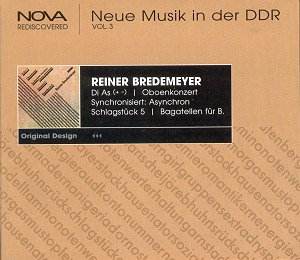After World War II Bredemeyer studied with Karl Amadeus
Hartmann and Karl Höller. He also studied privately with Carl Orff.
However, he later settled in East Germany and had further lessons from
Wagner-Régeny. Though influenced by the music of Webern, Bredemeyer
composed in a freely tonal idiom at odds with the aesthetics of Socialist
Realism. This is clearly evident in the works in this release, of which
the earliest is the short Bagatellen für B. Written
in 1970 (i.e. "Beethoven Year") and logically enough draws
on two Bagatellen by Beethoven which are incidentally added as
a bonus to this CD. This is thus a short homage for piano and orchestra
in which Bredemeyer explores Beethoven’s thematic material. An attractive,
though rather slender work.
Schlagstück 5 for percussion and
piano also dates from 1970. This is conceived as a metrically free dialogue
between the two players, and often sounds as a controlled improvisation
in which the players respond each other, thus creating an eventful and
colourful kaleidoscope.
Di As (+-) from 1973, scored
for the rather unusual combination of oboe and trumpet, is probably
the most experimental work in this selection of concert works by Bredemeyer.
The red thread here is the confrontation of diverging material, divergence
and duplication, agreement and disagreement, though the musical material
centres on A and its octaves. Variety is also achieved by some more
unusual playing techniques, such as playing in the mouthpiece and the
like. This demanding piece is, to my mind, the least approachable work
in this programme, but is nevertheless well worth having for its many
ear-catching sonorities and its instrumental virtuosity.
The Oboe Concerto of 1977 is more a suite
than a proper concerto. Its five concise movements, which may be played
in any order, nevertheless make many demands upon the soloist’s skill
and virtuosity, though never extravagantly so. It certainly is no easy
work; but, from the listener’s point of view, it is fairly straightforward
in its own expressionistic way. There is much contrast and variety as
well as expressive power in this very fine work which I for one find
the most readily appealing piece of music here. A superb reading too
by its dedicatee.
Synchronisiert: Asynchron (1975) is a
setting of texts by the Cuban poet Nicolás Guillén, both
in the original Spanish and (in playback) in the German translation
made by the composer. The German version is thus heard on tape whereas
the Spanish original version is sung live. Synchronisation is not absolute,
which results in some echoing canon, with just minor displacements in
the delivery of the sung texts, thus creating a subtle polyphony supported
by some expressionistic instrumental music. The piece was commissioned
by the East German radio to commemorate the victims of Fascism. However,
the quality of the music vastly transcends the overtly political meaning
of the piece.
From the works recorded here, it is clear that the
1970s were a period of experimentation and of final synthesis successfully
realised in the impressive Oboe Concerto. The present
release provides for a fascinating survey of Bredemeyer’s personal,
even idiosyncratic sound world. The performances are excellent and the
recorded sound has worn well. Well worth investigating.
Hubert Culot


